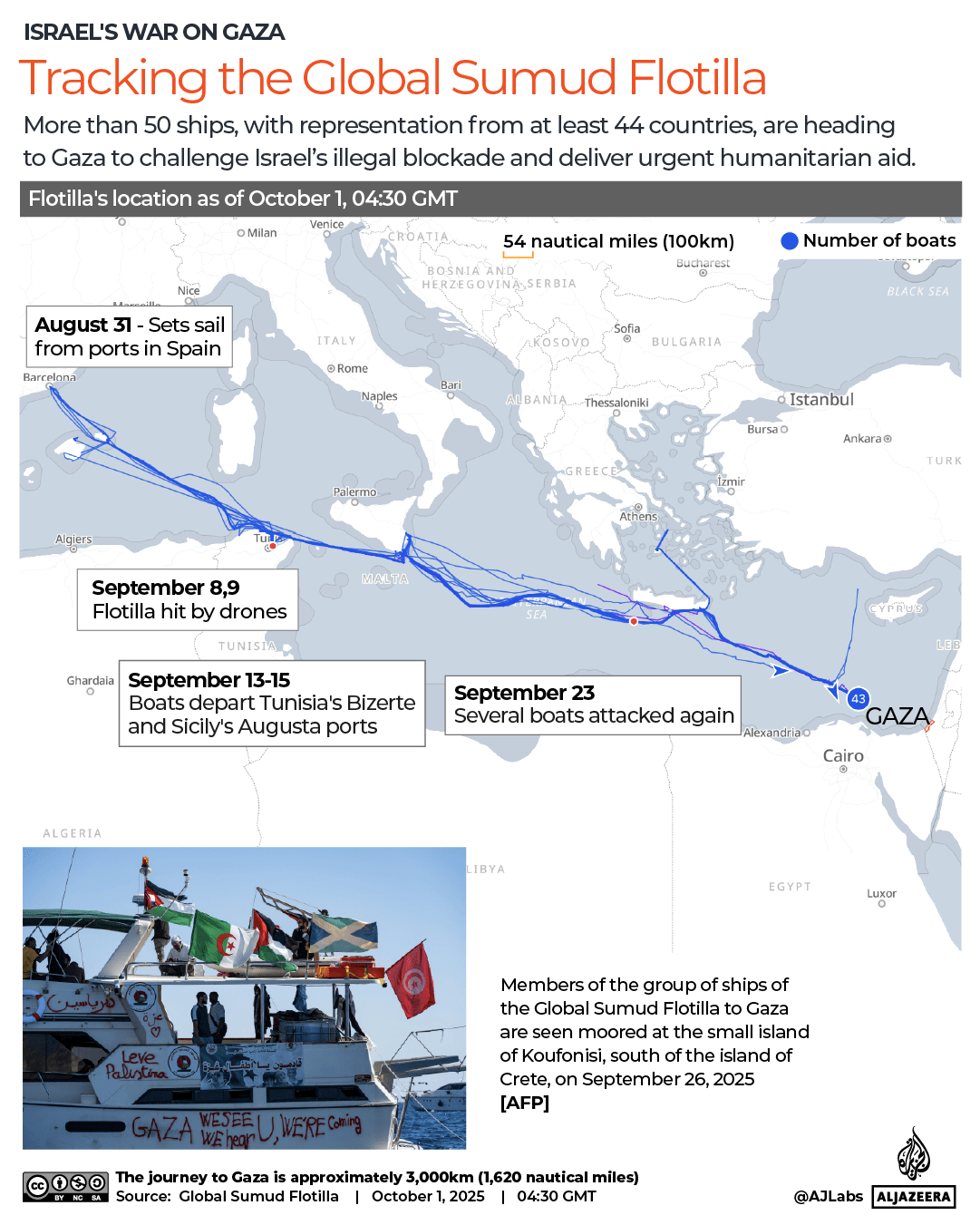A Gaza-bound aid flotilla is currently heading for the area’s high-risk area, where previous missions have experienced attacks and interceptions.
Israeli military “takes control” of the flotilla with naval commandos and warships, according to Israeli media outlet Kan on Wednesday. Kan predicted that Israel won’t tow all 50 ships, and that it will someday sink some.
Israel has the intention to detain hundreds of activists aboard naval ships, question them, and then deport them via Ashdod.
The largest maritime mission to Gaza to date, which sails from Spain on August 31. As part of a global campaign to oppose Israel’s naval blockade and provide aid to Gaza, it brings together more than 50 ships and delegations from at least 44 nations.
The most recent location is displayed on the map below:
Is Israel also permitted to board ships entering foreign waters? No, because of how territorial and international waters operate.
Which waters are under the control of a nation?
Territorial waters, which are 12 nautical miles (22 kilometers) off the coast, are administered by coastal nations. The state, like it does over its land, has complete control over this region.
They also have rights over the water and seafloor in up to 200 nautical miles (370 km) of ocean. The Exclusive Economic Zone (EEZ) refers to this region. Countries in the EEZ have the ability to regulate activities like fishing, mining, drilling, and other energy projects while still allowing other nations to have freedom of navigation.

Thanks to its overseas territories, France has the largest EEZ, which extends to about 10.7 million square kilometers (4. 2 million square miles). The US, Australia, Russia, and the UK follow it up with them.
International waters: where are they?
The high seas, which extend beyond any nation’s territorial waters and economic zones and are not under the control of one state, are a part of the ocean, and are subject to international agreements for their use.

What are the maritime laws?
The UN Convention on the Law of the Sea (UNCLOS) from 1982 governs the laws of the high seas. It permits the free movement of aircraft and ships on the high seas in all states.
Additionally, it permits fishing, scientific research, and the construction of islands. It also permits the laying of subsea cables and pipelines. three of which are bound by international laws and regulations.
Ships on the high seas are subject to the flag’s jurisdiction, aside from those engaged in piracy and other prohibited activities.
In international waters, Israel has previously attacked flotillas.
Since 2010, several Freedom Flotilla vessels have attempted to break the Gaza blockade. Israel has reportedly attacked or intercepted all of its vessels, most of which are in international waters without any territorial rights.
The Mavi Marmara was attacked by Israeli commandos in international waters on May 31, 2010, making it the most deadly. The commandos caused dozens of injuries and 10 fatalities to Turkish activists, the majority of whom were Turks, putting a severe strain on Israeli-Turkish relations.
The map below shows the locations where prominent flotillas were frequently stopped, some of which were attacked by Israeli-style rockets.

UN experts stated that Israel must not interfere with the Freedom Flotilla’s right to free passage in international waters, which is long recognized by international law, in 2024 as part of ongoing flotilla missions delivering humanitarian aid to Gaza.
The Sumud Flotilla had been sailing through Palestinian territorial waters, where it has the legal right to navigate and deliver humanitarian aid.
The International Transport Workers’ Federation (ITF), which represents more than 16.5 million transport workers worldwide, states that “the law of the sea is clear: attacking or seizing non-violent, humanitarian vessels in international waters is unlawful and unacceptable.
Such actions threaten lives and undermine fundamental principles that ensure everyone’s safe seas. It’s not just about seafarers; it’s also about everyone’s safety at sea, whether they’re aboard a business ship, a humanitarian vessel, or a fishing boat. States are unable to make their own decisions regarding the application of international law. According to Cotton, “the seas must not be transformed into a theater of war.”
The Freedom Flotilla Coalition claims that a comprehensive set of international legal instruments protects the mission while keeping it legal and safe. Including :

- The UNCLOS (UNCLOS) – guarantees freedom of navigation on the high seas
- The San Remo Manual on International Law for Armed Conflicts at Sea prohibits blockades that result in starvation or exaggerated suffering, and forbids the targeting of neutral humanitarian missions.
- UN Security Council Resolutions 2720 and 2728 – These legally binding resolutions demand the elimination of all barriers to aid delivery and unimpeded humanitarian access.
- Includes the prohibition of acts that intentionally put civilians at risk, according to the Convention on the Prevention and Punishment of Genocide.
- Imposes an obligation to permit the flow of humanitarian aid freely and to forbid interfering with relief operations and civilian infrastructure targeting.
- The International Criminal Court’s Rome Statute criminalizes the use of willful obstructing humanitarian aid and the starvation of civilians as a means of war.
Source: Aljazeera

Leave a Reply